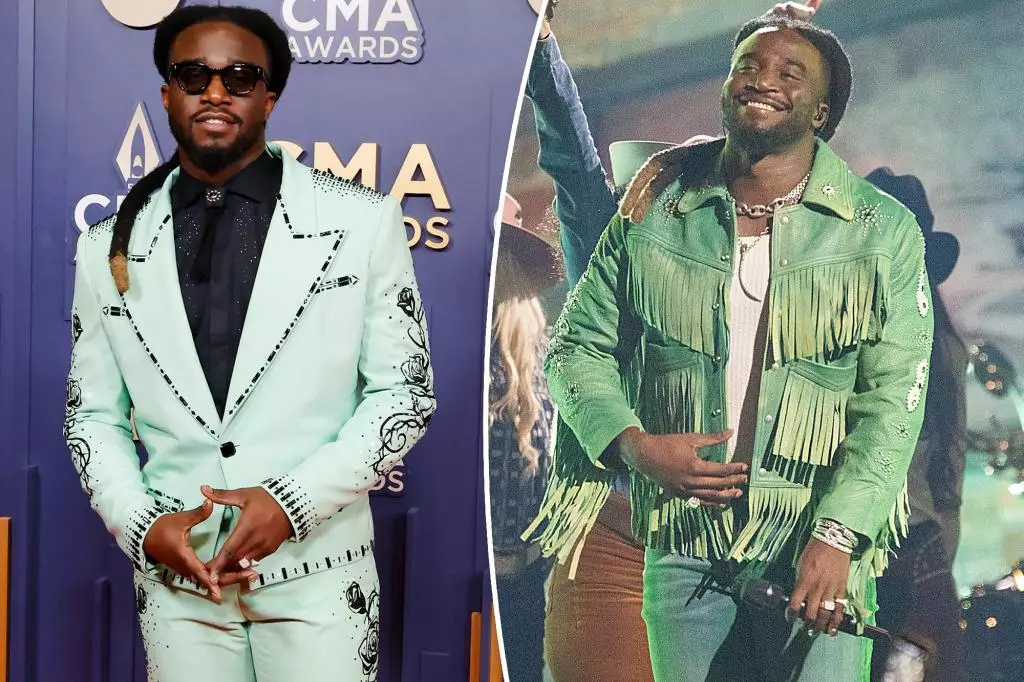The recent CMA Awards have sparked outrage among fans and advocates for diversity within country music after Shaboozey, a rising star within the genre, failed to secure victories in two categories for which he was nominated. Despite the undeniable success of his chart-topping hit, “A Bar Song (Tipsy),” the loss was viewed as a reflection of deeper systemic issues within the country music industry. Some fans took to social media, asserting that Shaboozey’s nominations were more about performative inclusion than genuine recognition of his contributions to the genre. This raises significant questions about the racial dynamics at play in an industry grappling with its own identity.
Criticism of the CMA Awards has centered around the idea that the event showcased a pattern of tokenism—a superficial attempt at inclusion without real support. Fans cited that Shaboozey’s nomination was more an act of public relations than an acknowledgment of his talent. One user on social media noted, “The CMAs nominated Shaboozey, not Beyoncé, to appear less racially exclusionary and preempt backlash.” This sentiment reveals a troubling trend where marginalized voices are brought into traditionally homogenous spaces, often under the guise of progressivism while real recognition, accolades, and opportunities remain elusive.
Several tweets echoed dismay, with comments emphasizing the overwhelming success of Black artists in country music this past year. It was lamented that even with Shaboozey standing out as one of the only Black nominees, the results indicated a reluctance to genuinely embrace diversity. Fans expressed frustration, stating, “them white folks made it loud and clear how much they don’t want black artists in country even though the genre is ours.” Such reactions highlight a qualitative disparity in recognition based on racial identity, particularly in a genre that has historically marginalized Black contributions.
Further complicating the narrative was co-host Luke Bryan’s past comments regarding the expectations placed on artists like Beyoncé to conform to country music standards in order to gain acceptance. His suggestion that Beyoncé “come into our world” echoes the larger theme of gatekeeping within the genre, where talent alone is often insufficient for success. Viewers noted that despite Shaboozey’s calculated efforts to engage with the country music community, including participation in courageously traversing Nashville’s traditional spaces, the industry still failed to award him for his achievements.
The public perception of these dynamics has influenced conversation around the legitimacy of the CMA Awards. Shaboozey’s storyline seems to reflect a pattern: artists of color who have made significant leaps in their careers still face barriers to recognition simply due to the color of their skin. As frustrations boiled over in online discussions, the narrative solidified that actions undertaken to “play the game” do not ensure fair treatment or acknowledgment.
The CMAs’ handling of Shaboozey’s nominations is symptomatic of a broader cultural issue in country music that has not only hindered the recognition of Black artists but has also influenced the genre’s evolution. Voices call for greater inclusivity, education, and recognition of the vast contributions of Black artists to country music. It is vital for awards shows and the industry at large to reflect on pastoral voices and rich histories that have shaped country music as we know it.
As calls for reform grow louder, the comments surrounding Shaboozey’s nominations urge a deeper reflection on not only the awards themselves but also the systemic structures that uphold racial disparities. Award shows must transcend performative gestures; true inclusion requires substantive change that recognizes and celebrates talent, irrespective of race.
The discussions surrounding Shaboozey and the CMA Awards bring to light critical issues worth addressing within the country music community. It is essential for industry leaders to reflect on their practices and commit to fostering an environment that truly amplifies diverse voices. Only by breaking down barriers and creating genuine opportunities for artists of all backgrounds can the genre move towards an authentic and equitable future.

